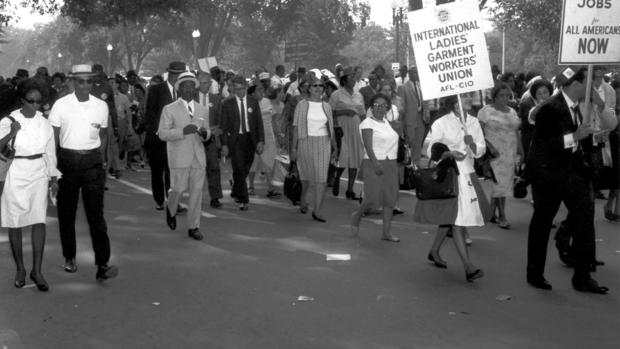50 years after March on Washington, a chance to reclaim the "Dream"
(CBS News) The March on Washington, formally called March on Washington for Jobs and Freedom, was the largest demonstration for social change that America had ever seen at the time. Now, 50 years later, we remember that historic moment in our nation's capital.
CBS News cultural correspondent Wynton Marsalis offered this essay on "CBS This Morning" about the messages of that day -- and a commentary on where we are as a country, half a century later.
Fifty years ago today, 250,000 Americans gathered on the mall of the Nation's capital to peacefully request social and economic equality for our most oppressed group of citizens: the American negro.
More than 25 people from all walks of life spoke, played, and sang that day, in an impressive tapestry of national leadership mobilized for jobs and freedom, and for redemption of the national soul.
The convener of the march, 74-year-old A. Philip Randolph, spoke first. Dr. Martin Luther King, Jr., 34, the charismatic focal point of the Civil Rights Movement, spoke last.
Dr. King's oration was, upon delivery, a recognized masterpiece. Over time, his words have become so well known that the march itself is reduced to one man's dream. In fact, it was much, much more. That day, everybody had a dream.
Oh yes, the march inspired a moral victory with broad social implications, but it provided no directives for tangible economic parity. And with the passage of time, a moral force without concrete works dies on the vine.
How many of us today know that it was called the March on Washington for Jobs and Freedom? I sure didn't. And it is now clear that poor and working class citizens need to be an integral part of our economic system. This necessity transcends race. Race is a matter of physiology; discrimination is a matter of culture, and culture shapes public perception, which influences political action.
Somewhere in the mid-1970s, I began to notice black and white artists stereotyping black people as criminals, pimps and drug dealers and gradually adding more and more misogyny and violence in movies, videos and recording after recording. The constant glorification and reselling of this debauched imagery has corrupted both blacks and whites understanding of Black America. Unfortunately, that shapes current public opinion much more than the memory of Dr. King's dream.
Following the success of Civil Rights legislation, many black Americans erroneously thought that the election of mayors with their same skin color would lead to an increasing economic prosperity. Even the electing of a non-white president was misconstrued as the culmination of the Civil Rights Movement. Let's examine the unemployment, incarceration and education statistics for the black and white poor. These sobering facts compel us to act on the collective dream expressed 50 years ago. A sustainable victory for equality and employment will not come through a prophet, a president, or even the law. It must be the will and actions of the people, all the people, all the time.
Dr. King ended the march triumphantly. His "I have a dream" refrain is rightfully known by all, but my favorite phrase drives home a profound human fundamental, enacted by everyone in attendance that day: "We cannot walk alone."
When we walk together, we are an infinite resource and can create unimagined possibilities. Separate, we are opposing tribes, fighting over what we mistakenly perceive as "never enough." Today is the perfect day to begin harvesting the endless promise in our way of life. When it was invested 50 years ago on the mall of our nation's capital, by a mosaic of high-minded leaders and 250,000 engaged activists. Let's walk together to claim our inheritance. It's out here for us.
For more with Marsalis, watch his full commentary and comments on "CBS This Morning" above.
